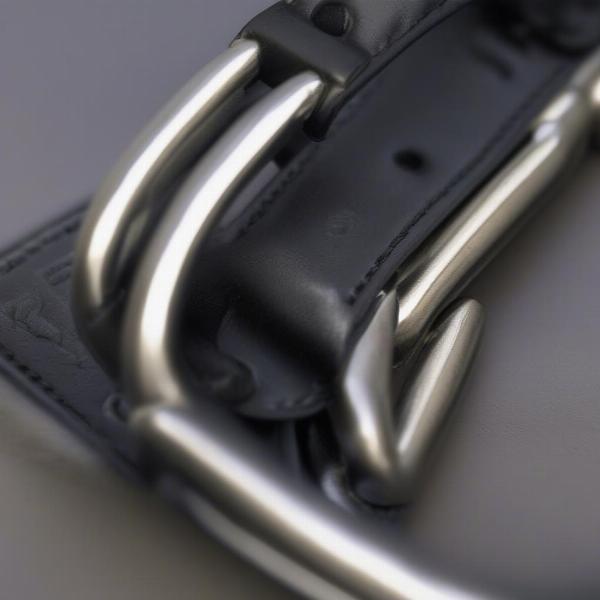Dominant dog collars, often referred to as prong collars or pinch collars, are training tools designed to provide clear communication and control during dog training. These collars work by applying pressure evenly around the dog’s neck when a correction is needed, mimicking the sensation of a mother dog’s bite. While they can be effective, it’s crucial to understand their proper use and potential risks to ensure the safety and well-being of your canine companion.
 Close-up view of a dominant dog collar
Close-up view of a dominant dog collar
Choosing the Right Dominant Dog Collar
Selecting the appropriate dominant dog collar is paramount for effective and safe training. Consider your dog’s size, breed, and temperament. Collars are available in various sizes and prong lengths, so consulting with a professional dog trainer or veterinarian is recommended to determine the best fit for your dog. A properly fitted collar should sit high on the neck, just behind the ears, and should not be too loose or too tight.
Are Dominant Dog Collars Cruel?
When used incorrectly, dominant dog collars can cause discomfort or even injury. However, when used properly by a knowledgeable owner, they can be a valuable tool for addressing specific behavioral issues, such as pulling on the leash, aggression, and reactivity. The key is to use the collar with gentle, controlled corrections, not as a punishment tool.
Using a Dominant Dog Collar Effectively
Training with a dominant dog collar requires patience, consistency, and a gentle touch. Quick, sharp corrections are generally more effective than prolonged pressure. The goal is to communicate clearly with your dog, not to inflict pain. Remember to pair the collar’s use with positive reinforcement, such as treats and praise, to encourage desired behaviors.
When to Use a Dominant Dog Collar
Dominant dog collars are not suitable for all dogs or situations. They are typically recommended for dogs who exhibit strong pulling tendencies, aggressive behaviors, or reactivity to other dogs or people. They are not recommended for puppies or dogs with certain medical conditions.
Potential Risks and Side Effects
While dominant dog collars can be effective, it’s essential to be aware of potential risks. If used improperly, they can cause physical harm, such as neck injuries or tracheal damage. They can also lead to psychological distress if used harshly or as a punishment. Always prioritize your dog’s well-being and seek professional guidance if you’re unsure about using this type of collar.
Avoiding Negative Associations
It’s crucial to avoid creating negative associations with the dominant dog collar. Never use the collar for punishment or out of frustration. Ensure your dog understands that the collar is a communication tool, not a source of pain or fear.
Conclusion
Dominant dog collars can be valuable training aids when used responsibly and under the guidance of a professional. However, it’s essential to understand their purpose, proper usage, and potential risks before incorporating them into your dog’s training regimen. Always prioritize your dog’s well-being and choose training methods that promote a positive and respectful relationship between you and your canine companion.
FAQ
- Are prong collars and dominant dog collars the same? Yes, they are often used interchangeably.
- Can I use a dominant dog collar on a puppy? No, they are not recommended for puppies.
- How tight should a dominant dog collar be? Snug but not restrictive, allowing two fingers to fit underneath.
- What are the alternatives to a dominant dog collar? Harnesses, head halters, and positive reinforcement training.
- Can a dominant dog collar hurt my dog? Yes, if used improperly.
- Should I consult a trainer before using a dominant dog collar? Absolutely, professional guidance is highly recommended.
- Can a dominant dog collar fix all behavioral problems? No, it’s a tool, not a magic solution.
ILM Dog is a leading online resource for dog owners worldwide, dedicated to providing expert advice on dog care, training, and well-being. We offer comprehensive information on a variety of topics, including breed selection, health and medical care, training and behavior, nutrition, grooming, and much more. For expert guidance on dog products and accessories, from dominant dog collars to everyday essentials, ILM Dog is your trusted source. Contact us today for personalized advice: Email: [email protected], Phone: +44 20-3965-8624. Visit us at ILM Dog.